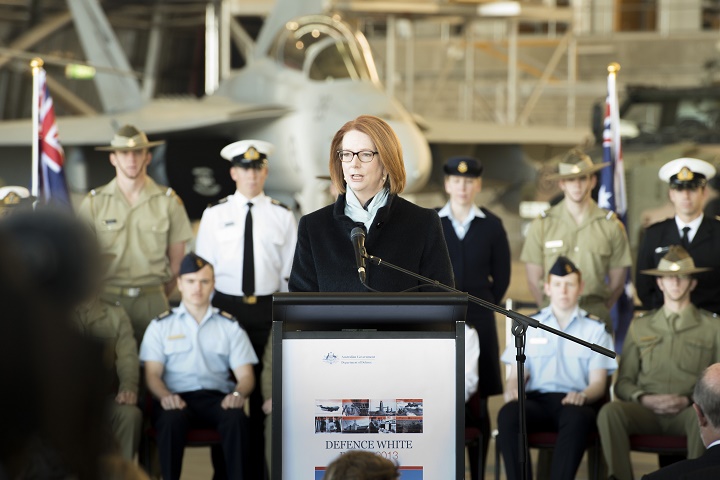
Julia Gillard writes that she inherited 'unrealistic' defence settings from Kevin Rudd and hints faintly that she bequeathed the same to the Abbott government. Just as Gillard needed a new defence policy because of Kevin Rudd, she needed a new Asia policy because of The Kevin. Gillard had to replace Rudd's unaffordable and faltering Defence White Paper, while her Asia Century White Paper gave her a chunk of foreign policy without Rudd's finger-prints all over it.
What was more important—the policy interests or the shadow of Kevin? Pointless question. Both sides of the equation were vital.
Remember Rule 1 of understanding Canberra: ‘
It's always personal'. The personal shapes power and shifts policy; see Gillard's grand swipe at Rudd and Bob Carr: 'After the 2010 election, I never had a Foreign Minister I could rely on’.
Gillard's
book is useful on defence policy, if not as vivid in its verbal voltage as it is about Rudd's 'destabilisation', 'leaking' and 'treachery’. In such a spirit, turn to Julia's demolition of the 2009 Defence White Paper. She makes familiar criticisms. But this is the Deputy Prime Minister who was present at the creation (of the mess). On the Rudd White Paper, Gillard writes: 'The overblown nature of the prose had drawn an adverse reaction from the Chinese and the budget rule laid out in the White Paper for defence expenditure was unrealistic and almost immediately breached’.
Gillard writes herself into a key moment of that overblown and unrealistic effort. The deputy PM filled in for Rudd as chair of the National Security Committee for a 'pivotal' meeting on reallocation of funds within Defence and new White Paper spending priorities: 'When the meeting had to break into a series of side conversations in the corners of the Cabinet room, it was obvious that the process was unravelling and the final product would suffer as a result’. Memo to Tony Abbott: watch those side conversations in the Cabinet corners at crunch moments for next year's White Paper.
Gillard disposes of her 2013 Defence White Paper in two paragraphs. She thinks it 'set more modest and realistic ambitions' and the document was 'methodical and careful’. The muted pass mark rests on the admission: 'Our government did not find the complete solutions’. Savour that negative nod as a moment when a politician hints that things possibly, perhaps, perchance, went less than perfectly.
Gillard gets all the headaches into one true, terse sentence: 'Defence has historically faced massive cost, time and capability problems when undertaking major procurements’. Yep. Thus, next year, Australia will get its third Defence White Paper in six years. This is quite something for a country that had been getting by with one White Paper a decade. Are the problems bigger or the deciders smaller?
On the conflict she presided over, Gillard concludes that Australia was right to commit to its longest war but hard news looms: 'In Afghanistan, I fear that we are to be disappointed again as democratic progress is stalled, even partially eroded, by poverty, governance incapacity, corruption, tribal politics and the predominance of the Taliban being reasserted in some areas’.
Gillard's big shift on the alliance was the announcement during President Obama’s Canberra visit that the US Marines would train in northern Australia. Considering the policy in Cabinet, the big worries were 'another nation's soldiers training on our soil' and 'the concerns of the foreign policy establishment about the regional reaction’.
Offering a fine rendering of the mix of personality, power, politics and policy in any such choice, Gillard describes how she rejected a cautious, small-steps approach to the Marines to go all-the-way-with-Obama:
I came to this view not because it was going to be easy, indeed managing regional reaction, particularly China's, had a high degree of difficulty. Rather I thought it was the right decision strategically for the future. It would meet an American need. It would facilitate joint training and exercises at a time beyond both our deployments to Afghanistan. It would show our preparedness to modernise the alliance between our nations. It would also send a self-confident message to our region that Australia was not succumbing to a dogma of false choices between valuing our alliance and our relationships in the region in which we live. I was also absolutely confident that the days of progressive Left protests against an American presence on Australian soil were behind us, and contemporary politics, including an America led by a Democrat, meant this initiative would be well received.
Julia was confident about handling the Oz Left and the Right of the Chinese Communist Party.
Graeme Dobell is the ASPI journalist fellow. Image courtesy of Department of Defence. Print This Post
Print This Post Julia Gillard writes that she inherited 'unrealistic' defence settings from Kevin Rudd and hints faintly that she bequeathed the same to the Abbott government. Just as Gillard needed a new defence policy because of Kevin Rudd, she needed a new Asia policy because of The Kevin. Gillard had to replace Rudd's unaffordable and faltering Defence White Paper, while her Asia Century White Paper gave her a chunk of foreign policy without Rudd's finger-prints all over it.
Julia Gillard writes that she inherited 'unrealistic' defence settings from Kevin Rudd and hints faintly that she bequeathed the same to the Abbott government. Just as Gillard needed a new defence policy because of Kevin Rudd, she needed a new Asia policy because of The Kevin. Gillard had to replace Rudd's unaffordable and faltering Defence White Paper, while her Asia Century White Paper gave her a chunk of foreign policy without Rudd's finger-prints all over it.